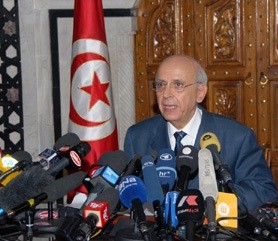|
Tunisia Politics | Human rights Tunisia police attacks large protest march
The Tunisian revolution is not over yet, a growing part of the population holds. Government and transitional authorities still are dominated by the old ruling RCD party and there is a growing feeling that the ancién regime is trying to prepare for its comeback after the July elections.
Not even Tunisian media are experiencing the new supposed liberty. State news agency 'TAP' still is government's mouthpiece; as is Tunisia's state-run television broadcaster. Today, hundreds of journalists at the state broadcaster however had enough, called for a strike and joined the protests, citing continued censorship. Consequently, the protest marches have grown in size in Tunis during the last weeks. Today, they organised the greatest protest since the 14 January revolution, with thousands demanding the old RCD regime to resign. For the first time in weeks, the protesters were again met with police violence. Uniformed riot police shot in the air and fired teargas at the protesters in downtown Tunis Habib Bourguiba Avenue. But also plain-cloth government agents attacked the protesters with sticks and batons. Bowing into the violence, the protesting crowds dispersed. Meanwhile, 'TAP' and the remaining journalists at the state broadcaster reported of youths committed to "looting and sabotage" that Both state-controlled media warned people against going to Habib Bourguiba Avenue, which had been closed by police. They aired an Interior Ministry call "for parents to urge their children to refrain from participating in the riots and vandalism." By staff writer © afrol News - Create an e-mail alert for Tunisia news - Create an e-mail alert for Politics news - Create an e-mail alert for Human rights news
On the Afrol News front page now
|
front page
| news
| countries
| archive
| currencies
| news alerts login
| about afrol News
| contact
| advertise
| español
©
afrol News.
Reproducing or buying afrol News' articles.
You can contact us at mail@afrol.com









